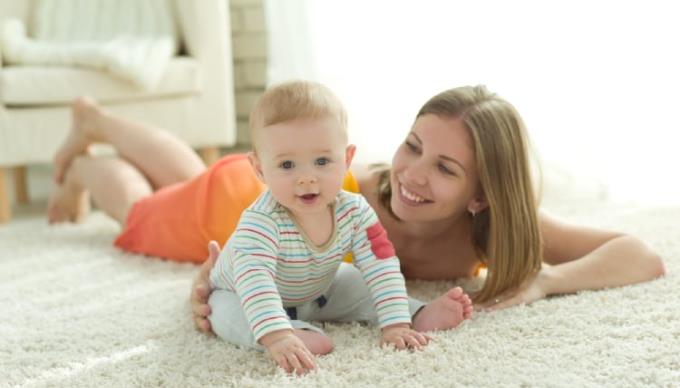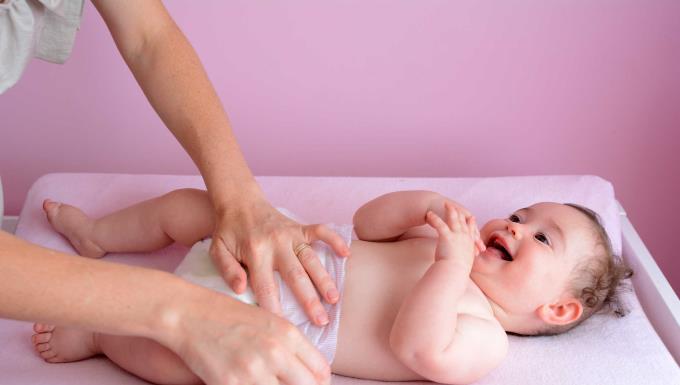Ways to determine an infants caloric needs

Learn how to determine your baby’s caloric needs, including the calories in breast milk and formula, to ensure your infant gets the right nutrition for healthy growth.
There are many causes of diaper rash in children. If handled properly and promptly, your child's immature skin will not be affected seriously.
Baby skin is extremely sensitive. Because of this, almost every baby has ever encountered diaper rash caused by bacteria and dirt. Without timely intervention, diaper rash can cause many negative effects, affecting the child's health.
How to early recognize the signs of diaper rash in babies so that there is a way to promptly handle and avoid complications for the child? Invite mom to find out!
Diaper diaper rash is a common type of skin inflammation in babies. This condition causes the appearance of one or more red patches in the area.
Babies with diaper rash are often fussy because of itching, discomfort, even pain in the skin. In the mild form, mothers can apply many home remedies such as changing diapers regularly, keeping the baby's affected area always dry and clean.
If the diaper rash is worse, such as an ulcer, discharge in the diaphragm that causes the baby to cry a lot or stop feeding, the mother needs to take the baby to the doctor to check the situation and have appropriate treatment.

When infected, the baby's skin will appear typical signs such as redness, tiny granules on the genitals, groin sides, buttocks and upper thighs.
Babies use crying to express their condition and wants. With diaper rash, babies are more uncomfortable and fussy than usual, especially while their mothers change diapers . Older babies often scratch diapers with their hands because diaper rash makes their skin itchy.

Diaper rash usually has a number of causes:
When baby's skin has a lot of time in contact with feces and urine, bacteria have more time to adhere and irritate their sensitive skin .
Fecal bacteria are more likely to cause diaper rash than bacteria in the urine. As a result, a baby with diarrhea or frequent bowel movements is at greater risk of developing diaper rash.
Your baby's sensitive skin may react to a new laundry detergent or washcloth. Fabric softener conditioner can also be the thing that isn't right for your baby's skin, causing it to itch, red or get dark.
The diaper area, including the genitals, buttocks, and thighs, is always more humid than the other skin areas. Therefore, this is a favorable environment for bacteria or fungi to live and grow.
They usually reside in the folds of the skin and then give rise to tiny red spots scattered around that skin area.
An inappropriate diaper is a diaper that is too tight or too big for the baby's size. When a baby is wearing a diaper too tight, the skin that has to rub against the diaper border repeatedly can cause red spots to appear or cause skin abrasions. Meanwhile, large diapers will become loose, easily spread bacteria from the diaper area to other skin areas and cause skin irritation.
Diapers are the place to "get" waste from the baby's body. The amount of bacteria in the diaper increases as the diaper fills. Therefore, if you let your baby wear a diaper for too long, the more time your baby's skin will be exposed to bacteria and irritation occurs.
Usually, the ideal diaper changing time for your baby is every 4 hours. However, for babies who frequently pee, diapers will fill up faster, so mothers need to change diapers sooner.
In addition, the baby has just entered the weaning stage or changes in diet, the frequency of bowel movements, the frequency of urination may increase, shortening the time using a diaper. Mom also needs to pay attention to this point to watch the right diaper changing time for the baby.
Many mothers often think that regularly wearing a baby diaper increases the risk of getting infected. Therefore, I do not let me wear diapers to dry my skin.
However, this is a misconception because in essence, a baby has lumps due to the skin being exposed to dirt, bacteria or mold. Meanwhile, the factors that cause skin rash are many in the outside environment, on the floor or on the surface of the mattress / mattress of the baby lying down every day. Not to mention that when the baby pee or poop, if there is no liquid absorbent diaper, the bacteria are very easy to act in the opposite direction, causing pigmentation.

Although diaper rash is a common condition in babies , if mothers know how to prevent them, they will avoid this phenomenon. Effective diaper prevention strategies recommended by many child health care professionals include:
When changing diapers, mothers use a cloth towel or soft, warm water towel to wipe the diaper area of the baby, wait for the skin to dry completely, then put on a new diaper.
On each diaper there is a full diaper line so that the mother can change diapers for the baby based on that. However, you also need to be flexible because sometimes that line only appears when the diaper is full of urine or has too much stool. In case the child has just put on a diaper and has not had pee but the baby has pooped a little, the mother should also change the diaper immediately.
Diaper rash is not uncommon in babies. Mother's good adherence to hygiene principles when taking care of the baby will limit the risk of this situation.
Learn how to determine your baby’s caloric needs, including the calories in breast milk and formula, to ensure your infant gets the right nutrition for healthy growth.
Discover the top 5 smartest dog breeds in the world, including Border Collie, Poodle, German Shepherd, Golden Retriever, and Doberman Pinscher. Learn about their unique traits and why they are considered the most intelligent dogs.
Discover 7 nutritious and delicious ways to cook egg porridge for babies, including recipes with cheese, pumpkin, tomato, and more. Learn how to prepare baby-friendly egg porridge with our expert tips.
After a series of medical measures they obtained a complete human vascular system profile.
Watermelon is one of the fruits that many people love, not only cheap but also delicious, nutritious and refreshing in the summer. To get delicious watermelon pieces, show off your housewives, your artistic talents to cut beautiful pieces of watermelon.
aFamilyToday Health - The digestive system and body in each baby is different. Parents need to recognize notes to deal with when babies have a food allergy!
Babies need many factors for perfect development. aFamilyToday Health shares with parents things to keep in mind when babies are 8 weeks old so that parents can take care of their babies the best!
Babies need many factors for perfect development. aFamilyToday Health shares with parents things to keep in mind when babies are 18 weeks so that parents can take care of their babies the best!
Babies need many factors for perfect development. aFamilyToday Health shares with parents things to keep in mind when babies are 28 weeks old so that parents can take care of their babies the best!
Babies need many factors for perfect development. aFamilyToday Health shares with parents things to keep in mind when babies are 32 weeks old so that parents can take care of their babies the best!








